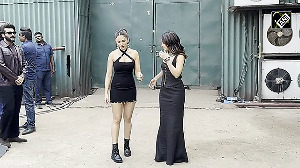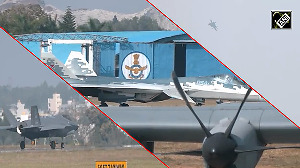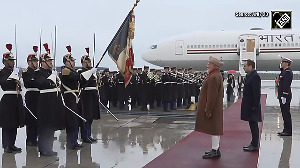"Prime Minister Manmohan Singh is unlikely to resign. He will do everything possible to push through the [India-United States civil nuclear] deal even now. If he had wanted to resign, he would have done it on September 9 or 10, when (Communist Party of India leader) Prakash Karat met Sonia Gandhi and read out the riot act.
"He clearly told her the Left parties will withdraw their support in no time if the government went ahead with the negotiations with the International Atomic Energy Agency."
This is what a non-Congress cabinet colleague of Dr Singh said on Monday, a day when the government came out in the open and said the deal is on hold till the next government-Left committee meeting on November 16.
The leader was reacting to reports in television channels about the prime minister's alleged outbursts at a meeting with the UPA allies at his residence on Monday morning, which UPA chairperson Sonia Gandhi also attended.
The prime minister's meeting with the UPA allies took place just before the scheduled session of the Left parties with the UPA at 4 pm to discuss the nuclear deal.
There was no question about what the outcome of the Left-UPA meeting would be. On Sunday, CPM leader Sitaram Yechury had told the media that the joint panel would come out with its report after Diwali. He also underscored that Monday's meeting might not be the last.
"There may be more meetings in the future. Till the meetings are over and till our concerns are taken on board, we expect the government not to proceed," he said.
So nobody was surprised when it was announced on Monday evening that the sixth meeting would take place on November 16.
What does this mean? Is there more to Monday's developments than meets the eye? Read on.
During the past one week, Communist Party of India chief A B Bardhan had been repeatedly demanding that the government clarify in Monday's meeting that "the deal is off or that it is on hold".
Only when the government comes out and says this in as many words will speculation about mid-term polls end, the CPI leader tirelessly argued.
But the statement read out by Pranab Mukherjee on Monday evening didn't say that deal was off. Mukherjee instead did exactly what Yechury said he would. Both parties have agreed that the deal will not be operationalised till the final findings of the committee.
What both the sides are not telling the country is that they disagree over the exact definition of the word "operationalise".
For the Left parties, the nuclear deal gets operationalised if the government goes ahead and begins negotiations with the IAEA. The government says the deal will be operationalised when the US Congress takes up the 123 Agreement for voting.
In essence, the status quo ante has been restored by the Congress, without either the government or the Left parties getting anything concrete.
The ball is now back in the Left front's court, exactly where it was before Karat had tossed it across to 10, Janpath, a fortnight ago. On the way, Mukherjee also handed down a virtual snub to the CPI.
As for the CPM, it should now look forward to spending Diwali, holding in its hand once again an open-ended nuclear deal.
Asked if the deal was dead, CPI general secretary D Raja told rediff.com: "The deal is not ON, but it is on hold."
More importantly, in Monday's meeting, the UPA again asked the Left parties to allow the government to go ahead with negotiations at the IAEA. Unsurprisingly, the Left parties refused to agree.
But the Left parties have been left in doubt about one thing: The government has not yet dumped the deal.
Throughout today, in its untiring attempt to pump some much-needed oxygen into the deal, the prime minister's office has been more active than the Congress.
It is becoming increasingly clear that in the coming two months, Dr Singh and the "fundamentalist supporters" of the nuclear deal would like to play political games to create an opinion in the public, which will be extremely hostile to the dogmatism of the Indian Communists in opposing India's proposed strategic relations with the United States.
The "Commie-bashing" may already have begun with prominent lawyer Ram Jethamalani hitting out at the Communists.
He has written a letter to Dr Singh ostensibly asking him to resign. But the real targets of his missile were the Communists.
He had written: "Comrade Karat is acting like a de facto prime minister of this country and I feel humiliated and ashamed of the way the senior Left leader is humiliating the prime minister."
He accused the Left leaders of holding the government to ransom. He told Dr Singh: "Literally, the Communists are compelling India to commit suicide. And I regret that at such a crucial moment in India's history both Sonia Gandhi and Manmohan Singh have lost their nerve."
The letter surfaced two days back, just ahead of the unconfirmed report being leaked to the media on Monday that at a meeting with UPA allies, PM Singh said, "I feel hurt."
Other unconfirmed reports said Dr Singh has categorically told the UPA allies that he is unwilling to budge any further on the issue of the nuclear deal and that he would be willing to opt out, if the allies refuse to support him.
There has been a clear attempt to build up massive psychological pressure on the UPA allies and against the Left.
The fake political tension built up with great dexterity by the prime minister's office died down only when late in the afternoon, Congress spokesman Abhishek Singhvi came forward to rubbish the story.
Then again, why was a prime minister's alleged dejection, depression or embarrassment being openly paraded before the country through orchestrated media leaks?
A senior non-Congress leader in the government explained to rediff.com: "Prime Minister Manmohan Singh is hurt. That is an open secret. He could not get the political support for the deal within the country and that has failed him in international diplomacy. He underestimated not only the Left parties but his UPA allies also. He is now not only turning against the Left leaders and the BJP, but he is also expressing his discontent with the UPA allies. It's not shrewd politics."
A senior leader and office bearer of the BJP observed: "If you compare the moves of Karat and Dr Singh, you can see who has been able to read more correctly the psyche of the UPA allies. The lust for power of the Congressmen and their UPA allies has been played effectively by Karat and that is the real cause of Dr Singh's embarrassment today."
A highly-placed source in the Congress claims Dr Singh is trying to drive the party towards an early election by forcing it to back the nuclear deal. According to him, Dr Singh has not retreated quietly, but is trying to reassemble the lobby for the deal even at the risk of inviting a mid-term election.
It is possible that the PM's political manoeuvring will be seen as separate from the Congress leadership's thinking. But, all the same, both are placed in a dynamic situation.
It is true that the UPA allies and a large section in the Congress want the government to continue and want to enjoy power for one more year. However, Dr Singh has to retrieve his lost "honour" and his government's standing vis-à-vis the George Bush administration.
And, of course, he has to give some reply to the political abuse being levelled at him (of being a lame duck PM).
But at the same time, he just might be taking an even bigger gamble after having lost out badly on the nuclear gamble. He is obviously relying on his residual strength.
It is generally believed that Rahul Gandhi is not yet ready to take over the reins of government. Dr Singh would, arguably, like to believe that the Congress is hardly in a position to find a replacement for him at this juncture.
To be sure, Dr Singh has another point of strength. He knows that within the Congress party, there is no love lost for the Left parties.
Congressmen knew -- even without Sitaram Yechuri telling them in a recent media interview -- that 54 MPs from the Left parties had defeated Congress candidates in West Bengal, Tripura and Kerala.
Dr Singh is counting on all those defeated Congressmen and pro-liberalisation leaders and lobbies who would relish giving a befitting reply to the Left parties in another election fought over the nuclear deal controversy.
All said, however, at least till the Gujarat election the Left parties and the UPA government would do all they can to avoid precipitating any kind of political confrontation.
Yes, there might be the occasional grandstanding in public view in the coming weeks. Yes, the two sides may naturally strive to extract whatever political mileage they can. But isn't that what "bourgeois politics" is all about?
Meanwhile, there is no guessing about which direction the momentum would build up: for the nuclear deal or against the deal?






 © 2025
© 2025